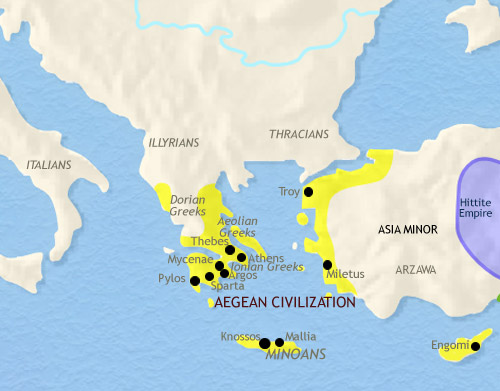The meaning of the Greek word ‘Gnosis’ (in the nominative case γνῶσις f.) is “knowledge of spiritual mysteries”, which is  derived from the Ancient Greek ‘упчгли’ – “to know or understand.” The adjective of this word is “Gnostikos”, and is “cognitive or intellectual.”
derived from the Ancient Greek ‘упчгли’ – “to know or understand.” The adjective of this word is “Gnostikos”, and is “cognitive or intellectual.”
The Old Latin word, ‘GNOsoo’ is where we get the modern Latin word ‘novi,’ which is a noun that means “actual knowledge that is the result of past learning”, and ‘noscos’ which is the present use of the verb ‘novi’; it denotes “to learn.”(1)
The Hebrew word “knowledge” (דעת da`ath) in the Septuagint, thus:
Proverbs 2.6 — The Lord gives wisdom (sophia), from his face come knowledge (gnosis) and understanding (sunesis)”
Ovid, the Roman-Greco poet who lived at the time of Augustus, had explained approximatelyt 2,000 years ago; “Gnosus or Gnossus was the chief city of ancient Crete, and from this word are formed the adjectives ‘ Gnosius’ and ‘Gnosiacus,’ (which are used as equivalent to the more general epithets ‘Cressius,’ ‘Cretaeus,’ ‘Creticus,’ ‘ Cretensis,’)
And likewise the feminine Graeco-poetic forms ‘ Gnosis’ and ‘ Gnosias,’ which are frequently placed absolutely, like ‘ Cressa,’ for Ariadne, ‘ puella’ being understood as in the line before us, and below
The towns next in importance to Gnosus were ‘ Gortys’ or ‘ Gortyna,’ and ‘ Cydonia,’ and hence the adjectives ‘Gortynius’ and ‘ Cydonius’ are equivalent to Cretan, as when Virgil names ‘stabula Gortynia’ and ‘Cydonia spicula.’ ‘Cressa’ is used absolutely by Propertius to indicate Pasiphaethe wife of Minos, and by Ovid in one passage for Ariadne3, and in another for Aerope. (Ovid: Selections for the Use of Schools, with Introductions and Notes )
This etymology is also where we get the Old Latin word when a person is lacking Gnosis, which is ‘ignotis’ meaning ‘unknown.” From the word ignotus, we get the modern meaning in English, ‘ignorant’ which in Latin is, ‘ignarus.'(2)
In Old Norse, the root word of Gnosis is “knā (to know how); the Scots spell it, “knaw (to know, recognize), and the Icelandic kná (to know, know how to, be able). In Persian, it is ‘kun-da’ which means learned. In German, Gnosis is spelled “kun-de, for knowledge and kenn-t-niet, for science”. It is from these Old Norse, Persian and German words where we get the modern spelling of ‘kundalini.’ In Old Irish, it is “conn for reason, sense, intellect, prudence.” (1) From this word, we get the English word ‘can’ (to know how) and then ‘cunning,’ meaning, “clever, artful, crafty etc.”
All these various spellings from around the world basically have the same meaning as the Greek word that we know of as ‘Gnosis’, and from these old Greek, Latin, Persian, Norse and Scot words, we get the modern English spellings of the words “know, knowledge, knowledgeable, knowingly etc.”(3)
Plato The Statesman — Stranger
In this way, then, divide all science into two arts, calling the one practical (praktikos), and the other purely intellectual (gnostikos). Younger Socrates: Let us assume that all science is one and that these are its two forms.
SOURCES:
1. Outlines of Etymology By Samuel Stehman Haldemam
2. First steps in Latin By R.F. Leighton
3. A dictionary of etymology of the English language: and of English synonyms … By John Oswald
RESEARCH:
The initial NO- is strictly the English kNO-w, so that normal has something to do with knowledge. But it has lost initial g- (gay in get,) present in the Greek GNOrizdo’ (I make known,) to search into, to acquire the knowledge of; GI-GNO’sko, to know, to learn; early Latin GNOsoo, afterwards NOsco to know, get knowledge of; Greek GNOmon a rule, square, Ac., also (German kenn-ung) the tooth by which a horse’s age is made kno-wn; Persian kun-da learned, wiso; German kun-de knowledge; kenn-t-niet science; kun-st art, Ac Irish conn reason, sense, intellect, prudence; Welsh cein-ad circumspection. English kno-w, ken, can, eouthe (affable, kind), cunning (formerly in a good sense), cann-y (cautious, Ac), and by dropping the initial—no-ble, no-table; but as this no- was originally gno-, and as n of the prefix in(not) was lost, the negative form of no-ble became i-gno-ble. – Outlines of Etymology By Samuel Stehman Haldeman
Know—Nosco, Scio, Gnorus for Gnarus, Logos, Historia, Sophia, Gnomon, Sagax, Sapio, Lego. See Understand, Wise. From L. notus, nosco, to know.
Knowledgeable—learning, erudition, letters, science ; wisdom, skill ; acquaintance, notice ; information ; of all things, omniscience. See Learning, Foresight. – A dictionary of etymology of the English language: and of English synonyms … By John Oswald

Moe is the founder of GnosticWarrior.com. He is a father, husband, author, martial arts black belt, and an expert in Gnosticism, the occult, and esotericism.









The term Epignosis is also used. Is there a difference? Does Epignosis mean knowledge of the outer or perhaps knowledge from the outer?
Does Gnome fit anywhere in this Etymology? Is it a coincidence gnomes resemble magic mushrooms?